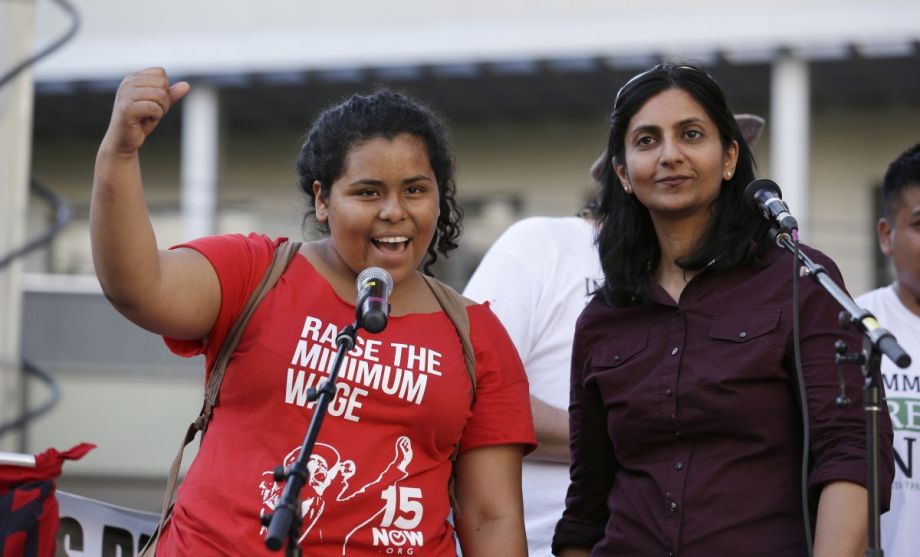On Tuesday, well over 100 people packed into a meeting room in Seattle City Hall for Council Member Kshama Sawant’s second annual People’s Budget Town Hall. The first socialist elected in the city in decades, Sawant held the gathering in response to Mayor Ed Murray’s proposed $5.1 billion 2016 budget, which the Councilor says caters to big businesses and wealthy residents while providing little for social services, housing, transportation, education and more.
It’s a harsh charge against a mayor who presented his proposal while drawing attention to the need for sustainable transportation, affordable housing, addressing homelessness, youth employment, social services and more. In his budget speech Murray called out “the global crisis of growing income inequality and longstanding issues of racial inequity” and promised that the city is “working hard to change this.”
“We all know Seattle is a wealthy city with a booming economy … yet year after year the city passes a budget that funds what big businesses deems acceptable,” Sawant said in her opening remarks this week. “Once again we have a business as usual budget from the Mayor’s office.”
Chief among her complaints was that Seattle is on year 11 of its 10-year plan to end homeless — and homelessness in the city is still on the rise. She also cited a need for an LGBTQ community center, especially after a sharp rise in anti-LGBTQ hate crimes last spring and summer. There were calls for better funding for public schools and more money to keep libraries open every day of the week. Sawant pointed out that access to libraries is important for decreasing the digital divide between rich and poor residents.
The People’s Budget Town Hall also diverted from strict budgetary qualms with calls for new forms of progressive taxation such as a mansion tax, an employee hours tax for funding transit and more. Washington is consistently ranked most regressive in the country for taxation.
But though Sawant and others at the Town Hall had sharp criticisms of the budget’s shortcomings, Murray’s proposal does allocate money for worker protections, new equity initiatives, immigrant and refugee assistance, homeless services, and more. The Mayor’s budget calls out over $5 million for equity projects as well as funding for several new staff positions in the Office of Labor Standards.
Rebecca Saldaña, executive director of community advocacy nonprofit Puget Sound Sage, says, “We think the Mayor’s budget shows major progress.”
Saldaña says in particular she and her colleagues are excited about funding for the Office of Labor Standards and the priority hire initiative. OLS was created after passage of the $15 minimum wage last year to ensure businesses are actually paying employees the right amount. The budget allocates $200,000 for OLS outreach and plans to hire two new staff to help with labor law implementation.
Saldaña says she’s also excited to see continued funding of the Mayor’s Equity and Environment Initiative. Launched by Murray last year, the initiative recognizes that low-income communities are often most affected by pollution and have the least access to parks and open space and the health benefits they provide. The initiative seeks to develop “community-based solutions” for these disparities and received an additional $100,000 in this year’s budget.
In addition, the budget has funding for expanding the library system’s mobile WiFi hotspot program, immigrant outreach, several million for homelessness outreach, shelter expansion, and new authorized homeless encampments and more.
Of course, Saldaña says, “there’s always more to be done.” Her organization wanted to see funding for Rainier Beach: A Beautiful Safe Place for Youth, a community-led, youth violence prevention program. But more broadly, she echoed Sawant’s calls for a more comprehensive approach to dealing with the city’s biggest drivers of inequity like employment and wages, affordable housing, and public safety.
“Low-wage work has increased and the number of people making really obnoxious sums of money is increasing. We need to make sure we’re dealing with underemployment and unemployment. This budget is in the right direction, but we need to do more to get those comprehensive solutions funded to make Seattle a city for all,” Saldaña says.
The Equity Factor is made possible with the support of the Surdna Foundation.

Josh Cohen is Crosscut’s city reporter covering Seattle government, politics and the issues that shape life in the city.
Follow Josh .(JavaScript must be enabled to view this email address)

















